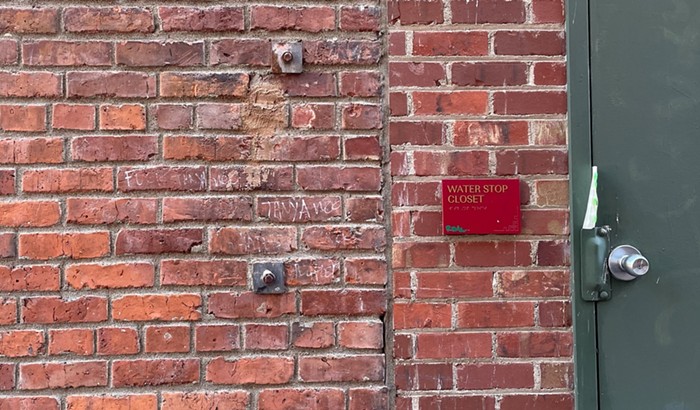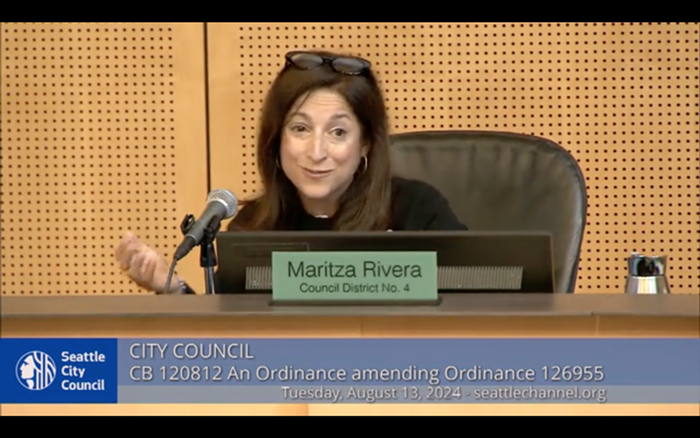In what is becoming a common ritual in council chambers, working people humiliated the Seattle City Council during Tuesday’s public comment period over Council Member Joy Hollingsworth’s attempt to permanently enshrine a sub-minimum wage for workers at businesses who employ fewer than 500 people.
Earlier this week, Hollingsworth took the bait from the restaurant lobby and introduced a bill that would forever establish a two-tiered minimum wage, allowing these "small" business owners to pay their workers less than larger businesses. In 2014, business won this tiered system as a key concession from labor during Seattle’s historic fight for a $15 minimum wage. The compromise, which Hollingsworth seeks to undermine, allowed small businesses to pay workers less than larger businesses until 2025, giving them a decade to slowly work up to the standard minimum wage.
Right now, small businesses only have to pay their workers $17.25 per hour, so long as their tips and benefits add up to the regular minimum wage of $19.97. The Office of Labor Standards has not yet set the 2025 minimum wage, but current law would require those businesses to give their workers at least a $3 raise next year. Hollingsworth’s bill would block that raise.
During the meeting at City Hall, small business owners claimed they could not afford to comply with the City’s basic labor standards, even after ten years of time to adjust, but workers argued they couldn’t afford for their bosses not to comply.
Minimum Wage Ain’t Shit
For small businesses who failed adequately to prepare during the last decade, the new wage could amount to a large expense. For example, Amy Fair Gunnar, co-owner of Portage Bay Cafe, told the Seattle Times that complying with a labor standard set a decade ago would likely cost her an additional $50,000 per month in payroll.
But workers need the new wage just to keep their heads above water. Sean Case earns minimum wage as a line cook at a restaurant in the U-District, and he spends about half of that wage on rent alone. A pay bump would mean Case could afford to stay in his apartment for another year. If he doesn’t get a raise, then he’ll need to move for the sixth time in eight years since landing in Seattle.
Case is far from the only worker struggling with the cost of housing. As the Seattle Times reports, almost half of renters in the Seattle area transferred 30% of their paychecks from their bosses to their landlords in 2022. Of those renters, half spent more than 50% of their income on rent and utilities. According to Apartments.com, the average one-bedroom apartment in Seattle costs about $2,042 a month. If businesses pay a full-time minimum wage worker about $35,000 per year after taxes, then that worker would need to log 120 hours per week to afford that rent.
Brianna Martinez earns the small business minimum wage tending bar in Capitol Hill. Last year, she worked four jobs at once to build up enough savings to allow her to scale down to one job. No matter what the Seattle City Council does about the minimum wage, she said she will have to pick up a second job soon. But if the council allows the sub-minimum wage to expire as planned, then her Apple Health plan might not feel so expensive, Martinez said.
Like Martinez, about half of US adults expressed difficulty in affording health care, according to a 2024 poll by KFF, a nonpartisan health policy research and polling organization. Low-income earners reported more difficulty than average, with about 69% of people earning less than $40,000 claiming difficulty in affording the costs. In that same poll, almost 30% of people earning less than $40,000 reported skipping or postponing care for fear of the price tag.
Odessa Forager earns the small business minimum wage at a restaurant in Capitol Hill. If she earned $3 more per hour, she said she’d make $6,200 more per year before taxes. With that money, she imagined she could pay off debts, or move out of her “dilapidated” apartment, or resolve the tough choice she’s sometimes forced to make between eating and paying her bills on time.
In 2021, about 10% of adults in King County faced food insecurity, meaning, like Forager, they experienced “limited or uncertain availability of nutritionally adequate and safe foods, or limited or uncertain ability to acquire acceptable foods in socially acceptable ways,” as defined by the US Department of Agriculture. Almost 40% of households making less than $20,000 per year in King County between 2018 and 2021 faced food insecurity. About 30% of households making less than $35,000 faced food insecurity as well. According to a 2023 study by King County Public Health, food insecurity has increased and now outpaces pre-pandemic levels. Food insecurity was at least twice as high among the lowest income earners.
Workers Failed to Consider the Pandemic
Regardless of workers' struggles, small businesses claim they can’t–or don’t want to–pay the cost of the basic labor standard agreed upon ten years ago. Owners such as Charlie Anthe of Moshi Moshi Sushi and David Olson of Anthony’s Restaurant blame their empty pockets on the pandemic and record rates of inflation.
Martinez said that she found it “laughable” and “insulting” that the Seattle Restaurant Alliance, a group that has lobbied council members behind the scenes for the last two months, would use the pandemic as an excuse to attack the minimum wage. The argument, as Case said, fails to acknowledge the reason businesses survived at all—their workers.
“Who kept these restaurants open during the pandemic?” Case asked in an interview with The Stranger. “We were working way harder than we ever had in my experience, and we were also making less money because tips were just in the fucking toilet for most of that period. Workers kept these restaurants open, and now we're being rewarded for that with a pay cut.”
Case, Martinez, Forager, and many workers who spoke during public comment Tuesday also argued that workers shoulder more of the burden of inflation than owners. The research seems to agree. The Federal Reserve Bank of New York reported last October that the bottom 40% of earners saw inflation rates of 0.16 percentage points greater than average.
At the same time, Martinez recognized that small businesses are truly struggling to stay open. In downtown alone, almost 2,400 businesses shuttered from 2020 to 2022, according to analysis by the Puget Sound Business Journal.
Shirley Henderson, co-owner of Squirrel Chops coffee shop in the Central District, empathizes with fellow small business owners. Still, many businesses at the higher end of the 500-employee cap really should have figured out their wages by now, she added. Henderson employees six workers, and they all make $19 per hour plus tips. She said Squirrel Chops will start paying $20 per hour this summer in part to prepare for the end of the two-tiered system, but also because she values her workers.
“We know that when our staff can afford rent and can afford food and when they're able to thrive, our businesses thrive too,” Henderson said in a phone interview.
But Henderson said many small business owners are picking fights with the wrong people. Hollingsworth’s legislation pits small business and workers against each other when really they have a common enemy in big business, the ultra wealthy, and policies that allow them to concentrate greater wealth in fewer hands, Henderson argued.
If the Seattle City Council wants to help small businesses, Henderson suggested passing commercial rent control or hiking taxes on big businesses to subsidize the smaller ones. I wouldn’t hold my breath with this landlord-loving, tax-adverse, corporatist council.
Political Suicide
It is unclear how Hollingsworth will react to criticism of her bill. She did not respond to my request for an interview, but she’s certainly put herself at the center of what can only be a very loud, very long fight. With this legislation, she has declared war on all minimum wage workers in the city, pulled former Council Member Kshama Sawant out of her grave, and betrayed labor. As former SEIU 775 President David Rolf said in the Seattle Times, “Undermining Seattle’s minimum wage law is political suicide for anyone who tries.”
There’s a chance this saga lingers like Council President Sara Nelson’s seemingly failed attack on the gig worker minimum wage. The Seattle Ethics and Elections Commission could ask Nelson and Council Member Tanya Woo to recuse themselves over ties to the restaurant industry, which would kneecap the council’s conservative voting bloc.
The so-called “do-nothing” council may also just run out of time. They only have a few weeks before they go to recess at the end of August. Then the Mayor will transmit his draft budget at the end of September. Those negotiations take most of the rest of the year.
But letting this issue fade away probably wouldn’t protect Hollingsworth's reputation. As Sawant said in a press conference Tuesday, Hollingsworth should withdraw her bill and apologize to the workers of Seattle.
Organized labor also wants Hollingsworth to tank the bill. UFCW and MLK Labor Council, two labor organizations who endorsed her despite her support from business and real estate, are both pleading their case against it. UFCW 3000 Secretary-Treasurer Joe Mizrahi said that he hopes Hollingsworth will listen to the outrage from unions and rank-and-file workers and withdraw her bill before it even goes to a vote.
“We endorsed Hollingsworth because she said all the right things. Now it’s time for her to do the right things,” Mizrahi said in a phone interview.
Mizrahi said the council should not want to go down in infamy as the body that attacked the minimum wage. Workers don’t forget, he said. In 2023, former Council Member Andrew Lewis lost his election in part because UNITE HERE! Local 8, which funded Lewis's victory in 2019, didn’t give him a dime in 2023. The union believed he failed to lead on labor issues as he promised. In 2011, then-Council Member Richard Conlin cast the lone vote against paid sick leave. Mizrahi said that vote cost him his reelection campaign against Sawant.
So tread lightly, Hollingsworth, or else a real labor champion may rise in a few years.




















